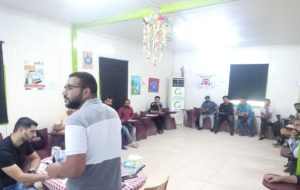From Fleeing To Freeing
Yousef RasheedFrom Fleeing To Freeing
A Syrian refugee shares his story on how fleeing his home left him traumatized and how he is working to free himself and others.
My name is Yousef Rasheed. I am 31 years old, and I am from Syria.
In the beginning, I thought the protests were going to be peaceful. Then I noticed the weapons. Eventually, I was forced to join the army. I stayed in the army for approximately 4 months and underwent training. However, I did not want to be a part of this war. So I decided to flee. The village I used to live in was coming under heavy fire. My family and I did not feel safe. I knew we had to leave.
I fled to Jordan with my sister. Two months prior, her husband had been killed. In Islam, when a woman is widowed, she needs to be accompanied by a male guardian for a certain amount of time. So I came with my sister and her three kids. My mother stayed behind.
We travelled all day and all night. Once we arrived at the Jordianian border, they checked our papers. Representatives from the UN Refugee Agency checked to see if we needed any medical care. We were then transported to the Z’aatari Refugee Camp.
Upon arrival, I noticed they were not really prepared to take on more refugees. The weather was terrible, very dusty, and the sun was harsh. The camp was in an area that is considered to be a desert.
When I was home, I was a university student. Now I was responsible for my sister and her kids. This was an abrupt change. I felt traumatized. I lost my home, and my family was separated. I was not able to accept that in the beginning. For the first few weeks, I felt so overwhelmed that I did not want to leave my tent.
When I first arrived, I was immediately given food. I was exhausted, I had no energy. They gave me blankets, a mattress, and a tent. Later on, I met other people at the camp that went to the same university as me. They supported me as well. They told me that there were a lot of non-governmental organizations working at the camp. I can take courses and I might get a job. Back at home, I was studying mechanical engineering but here I got interested in mental health and psychosocial support.
I got involved with Beyond Conflict after I saw an advertisement on social media where they were looking for facilitators. I was immediately interested because it had to deal with psychology so I applied.
I took several courses at the camp and they were all related to mental health. However, the difference between those courses and The Field Guide for Barefoot Psychology, is that the field guide goes in depth about mental health. When I was in Syria, I was never involved with anything that had to do with this but here at the camp, I can relate to what was going on with the people since I, too, was traumatized.
I learned about anxiety, and how it affects my body and well-being. I also learned about self care. Although we are not licensed experts, we learn how to take care of ourselves and can teach others how to do the same.

The stigma around mental health is very common in the Middle East. Men in our culture always pretend to be very strong because it is not okay to say you are feeling down or weak. It is also not socially acceptable for men to cry, resulting in them feeling burned out. They do not seek any help for their mental health and there is a lack of doctors in Jordan who specialize in this. I want our men to know how to take care of themselves, and give them the tools that will help them feel better.
This is why I believe in The Field Guide.
I know what it has done for me and others. Now I am hopeful for the future. I plan to leave the camp, live in an urban area, and give my three young girls a better life and a better education.
____
Over 82 million people around the world have been forced to flee their homes including 6 million Syrians. Support our mental health work at the world’s largest Syrian refugee camp. Donate today.